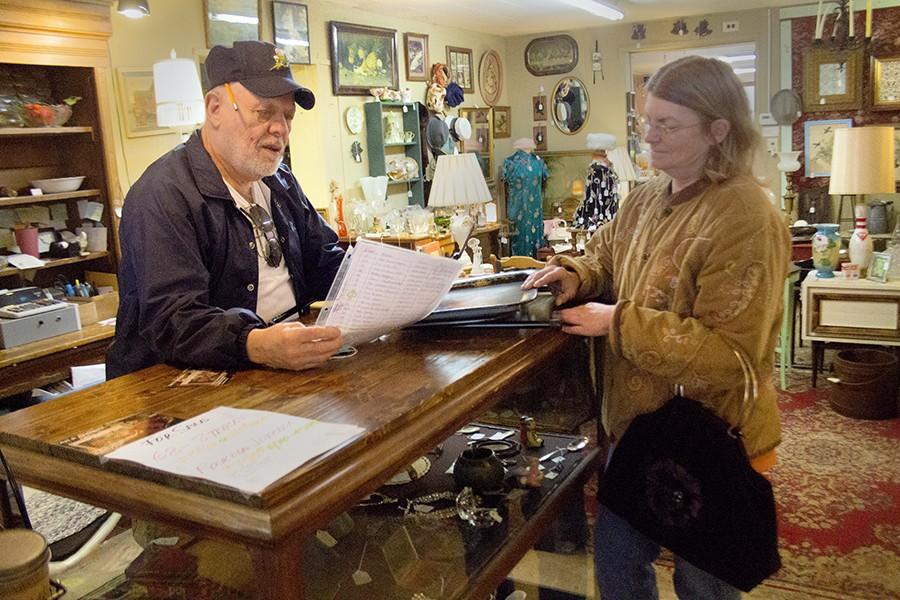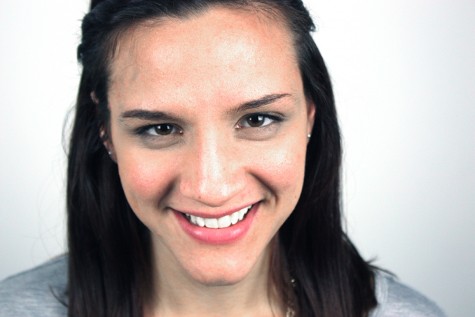Businesses need financial skills, personal relationships to be successful
Ron Stearns speaks with a client, Tammy Leonard about an item to potentially sell at Copper Eagle.
March 25, 2015
Rhonda Adair, owner of the Copper Eagle, a Charleston antiques and vintage shop, which has been around for 10 years, attributes her success to maintaining good relationships with her vendors and customers.
“We talk to vendors, take care of vendors and shoppers,” Adair said. “We’re looking at it from both aspects.”
Adair said she opened the store because she thought it was a niche that needed filling in Charleston.
There were not many antique shops when Adair started.
“When one opens, it paves the way for others,” Adair said. “It builds on itself, I think.”
Adair said the one of perks of being in Charleston is getting to meet customers of all ages.
“Young people, older people,” Adair said. “They have many interesting things, it’s like going back into a time machine.”
Cindy White, the president and CEO of the Charleston Chamber of Commerce, said anyone who starts a business like Adair did has a lot of prep work ahead of them.
This work includes creating a business plan and checking out the competition and the market.
“Financially, you have to see how much it’s going to tax,” White said.
Business plans are needed for financial institutions to offer loans.
“Most people who want to start a business don’t have the money,” White said. “They need investments, loans.”
Charleston does not have many extra restrictions or regulations to open a business.
“Except you probably can’t open a strip club,” White said.
The process of opening a business would be the owner deciding if they are ready to start, then going over to the courthouse and registering with the County Clerk.
“Formally, it has to be processed,” White said.
Businesses who need help with these items have many resources available to them. They can go online and search business plan templates, and there are also people who can help locally.
One of these people is Tiffany Kline, a business coach and counselor at the Sustainable Entrepreneurship through Education and Development center.
“My roles are interchangeable, I’m mainly a business coach,” Kline said.
She helps people in 10 areas around Coles County who are starting new businesses or expanding current ones.
“They call the SEED center online, we get in touch with them, and work together to help get a businesses plan, and look at finance options,” Kline said.
This service is free and confidential.
“Everybody I work with is so completely different,” Kline said. “A lot of them have had a hard time with the business plan.”
Kline said many are overwhelmed with the suggestions that come up in online searches, so much that they even want to give up.
“There are also people who have problems with the financial side,” Kline said.
She said this was because people might be good at their trade, but not so good with finance.
“For instance, there could be a baker, the best baker in the world, who has trouble creating financial statements,” Kline said. “I can’t make a cupcake to save my life, but I can show them how to handle financial statements.”
This makes it possible for Kline and her client to work as a team.
“With financial statements, I don’t just write it up,” Kline said. “I make sure they know what the numbers mean.”
Richard Wilkinson, a family and consumer sciences associate professor, said businesses look at a lot of factors when they decide where to locate.
“Primary factors are the size and nature of the market and other characteristics,” Wilkinson said. “You have to have people to buy things before it’s going to be successful.”
These factors and their importance varies based on what each business is selling.
“They look at income level, education, age,” Wilkinson said.
Education and income level matter because there are some businesses that need to be in places with people that have higher income or education levels to understand what they are selling.
Wilkinson said an incentive for stores or restaurants to come for Charleston is the large student base.
“Just look at how many restaurants cater to a younger crowd,” Wilkinson said. “It’s an incentive of the kinds of businesses in Charleston. They target college age students, as seen by the number of fast food restaurants.”
The faculty and staff also attract businesses.
“People with experience in life sciences, technology can help businesses,” Wilkinson said. “If people want to sell online, there are people on campus that could help them.”
Wilkinson said Charleston might be less attractive as a business location is the fact that it is not as close to the interstate as other areas.
“A lot of people rely on the interstate, they’ll pull off to go to shopping,” Wilkinson said. “They’re not going to drive a mile.”
Some students wonder why Charleston does not have the same kinds of chain restaurants as other cities.
“Many students ask, ‘Why not have a Panera?”’ Wilkinson said. “The answer is it’s not big enough.”
He said many businesses rely on the population, in order to reach the amount of sales they need per day.
Although Charleston is not big enough to support certain chain restaurants, it is still able to have grocery stores, gas stations, and other places people need to live.
“Smaller stores that don’t need as high of sales, will be put in smaller towns,” Wilkinson said.
Although not many chains may come to Charleston, a lot of small businesses do.
“The Chamber of Commerce loves to see new businesses come to Charleston,” White said. “They’re the lifeblood of the economy.”
Cassie Buchman can be reached at 582-2812 or cjbuchman@eiu.edu.




![[Thumbnail] Eastern's Old Main was quiet Thursday morning while educators who had left the office to strike picketed outside.](https://www.dailyeasternnews.com/wp-content/uploads/2025/04/Strike_01_LT_O-800x1200.jpg)










![[Thumbnail Edition] Senior Foward Macy McGlone, getsw the ball and gets the point during the first half of the game aginst Western Illinois University,, Eastern Illinois University Lost to Western Illinois University Thursday March 6 20205, 78-75 EIU lost making it the end of their season](https://www.dailyeasternnews.com/wp-content/uploads/2025/03/WBB_OVC_03_O-1-e1743361637111-1200x614.jpg)














![[thumbnail edition] Assistant Coach of the Linebackers, Rodman Noel talking to the linebackers about their positions at O'Brien Field on the Eastern Illinois University campus, Charleston Ill.](https://www.dailyeasternnews.com/wp-content/uploads/2025/04/FB_24_O-1-e1744671213207-1200x609.jpg)










































